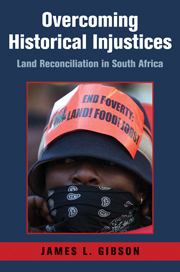Book contents
- Frontmatter
- Contents
- List of Figures
- List of Tables
- Preface and Acknowledgments
- 1 Land Reconciliation and Theories of Justice, Past and Present
- 2 Naming, Blaming, and Claiming on Historical Land Injustices: The Views of the South African People
- 3 Group Identities and Land Policy Preferences
- 4 Applied Justice Judgments: The Problem of Squatting
- 5 Judging the Past: Historical versus Contemporary Claims to Land
- 6 Land Reconciliation and Theories of Justice
- Appendix A A Note on Race in South Africa
- Appendix B The Survey Methodology
- Appendix C The Questionnaire
- References
- Index
- CAMBRIDGE STUDIES IN PUBLIC OPINION AND POLITICAL PSYCHOLOGY
Preface and Acknowledgments
Published online by Cambridge University Press: 27 July 2009
- Frontmatter
- Contents
- List of Figures
- List of Tables
- Preface and Acknowledgments
- 1 Land Reconciliation and Theories of Justice, Past and Present
- 2 Naming, Blaming, and Claiming on Historical Land Injustices: The Views of the South African People
- 3 Group Identities and Land Policy Preferences
- 4 Applied Justice Judgments: The Problem of Squatting
- 5 Judging the Past: Historical versus Contemporary Claims to Land
- 6 Land Reconciliation and Theories of Justice
- Appendix A A Note on Race in South Africa
- Appendix B The Survey Methodology
- Appendix C The Questionnaire
- References
- Index
- CAMBRIDGE STUDIES IN PUBLIC OPINION AND POLITICAL PSYCHOLOGY
Summary
Anyone who lives in South Africa for extended periods of time, as I have, cannot help but be impressed with how pervasive issues of land are. Virtually every day, the newspapers report a land story, be it one about the evictions of squatters from public property, the efforts of dispossessed peoples to regain their land and their treasure, or the plight of farmer workers and their efforts to establish tenure on their living places. Land issues are everywhere, nearly all the time.
And there is no shortage of policy attention to the problems of land. Conferences are held regularly involving scholars, activists, and NGOs, and some amount of published material is emerging on the land problem in South Africa. Everyone seems to recognize the importance of “the land problem” for the future of South Africa's nascent democracy.
What is missing from much of the discussion is any systematic attention to the expectations, experiences, and preferences of ordinary South Africans. Most students of land politics know practically nothing about the beliefs, attitudes, and behaviors of the average person-in-the-street. Part of this omission is a function of the lack of survey research skills among South African scholars and students – and certainly the costs of conducting surveys are well beyond the means of most scholars and many funding agencies – but perhaps a larger part goes to the disdain that many hold for ordinary people.
- Type
- Chapter
- Information
- Overcoming Historical InjusticesLand Reconciliation in South Africa, pp. xv - xxPublisher: Cambridge University PressPrint publication year: 2009



